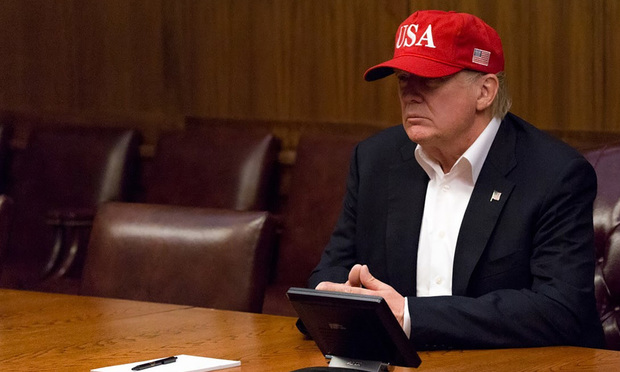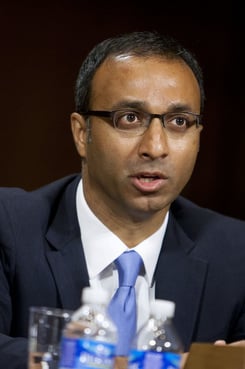 President Donald Trump. Credit: Shealah Craighead/ White House
President Donald Trump. Credit: Shealah Craighead/ White House
The government’s so-called Glomar responses in a federal public records case in Washington could be undercut by the president’s tweeting habits.
The FBI is defending its refusal to either confirm or deny the existence of certain documents in response to a Freedom of Information Act suit against the bureau and other agencies. At a hearing Friday, U.S. District Judge Amit Mehta struggled with whether the president’s tweets, which the government conceded are official statements, undercut that refusal.
The plaintiffs, Politico reporter Josh Gerstein and the James Madison Project, want the federal agencies to turn over a two-page synopsis they reportedly have on the claims in the “Russia dossier,” an unverified document that made claims about the president. Gerstein also seeks any determination by the agencies as to the validity of the dossier, and any records about what effort, if any, federal officials made to investigate the validity.
Gerstein’s lawyers, Brad Moss and Mark Zaid, argue that because Trump has tweeted that the dossier is “fake,” and other unofficial statements from former officials such as James Comey indicate intelligence agencies have reviewed it, the government has essentially already disclosed that the documents exist and therefore can’t make a Glomar response.
Workers of firm involved with the discredited and Fake Dossier take the 5th. Who paid for it, Russia, the FBI or the Dems (or all)?
— Donald J. Trump (@realDonaldTrump) October 19, 2017
Much of the case relies on a precedent set in a 2013 Freedom of Information Act case, in which the ACLU sought documents related to the Obama administration’s use of drone strikes. In that case, the D.C. Circuit ruled that even though the CIA had not officially said it used drone strikes, other statements from officials, including then-President Barack Obama, indicated it was “neither logical nor plausible” that the CIA did not at least have an interest in the issue and had documents on it.
Mehta pushed Moss to explain how or why they believed Trump tweeted information about the dossier that he learned from federal agencies. Moss said the plaintiffs didn’t know, but that under D.C. Circuit case law, the default is to presume that when the government makes an official statement, it is done in the course of official duties and therefore relies on official information.
 U.S. District Judge Amit Mehta. Credit: Diego M. Radzinschi / ALM
U.S. District Judge Amit Mehta. Credit: Diego M. Radzinschi / ALM
Mehta posed the same question to Justice Department lawyer David Glass, who represents the agencies along with Elizabeth Shapiro. The judge asked specifically about tweets in which Trump said the dossier was “fake” or “unverified.”
“Why shouldn’t I infer … that an affirmative statement that [the dossier is] discredited is not based upon official information?” the judge asked.
“Because he didn’t say so,” Glass replied. Glass said the dossier was presumed to be about the president himself, so he could have been tweeting based on his own personal knowledge or even based on news reports.
While the FBI has given the Glomar response with respect to all documents Gerstein requested, the other agencies have confirmed the existence of the two-page synopsis. However, they are not releasing it on the grounds that it contains classified information.
The judge said he would try to make a decision soon, but appeared puzzled by the question the case presented.
“A lot of food for thought,” Mehta said, before ending the argument.
Read more:
Trump’s Tweets Are ‘Official Statements,’ Feds Tell Court
@realDonaldTrump’s Tweets Are ‘Authority’ in Advocates’ New Travel Ban Filings
President Trump’s Immunity Claims Face Scrutiny in Twitter Suit
Cleary Gottlieb Publishes Trump ‘Social Media Attack’ Survival Guide


